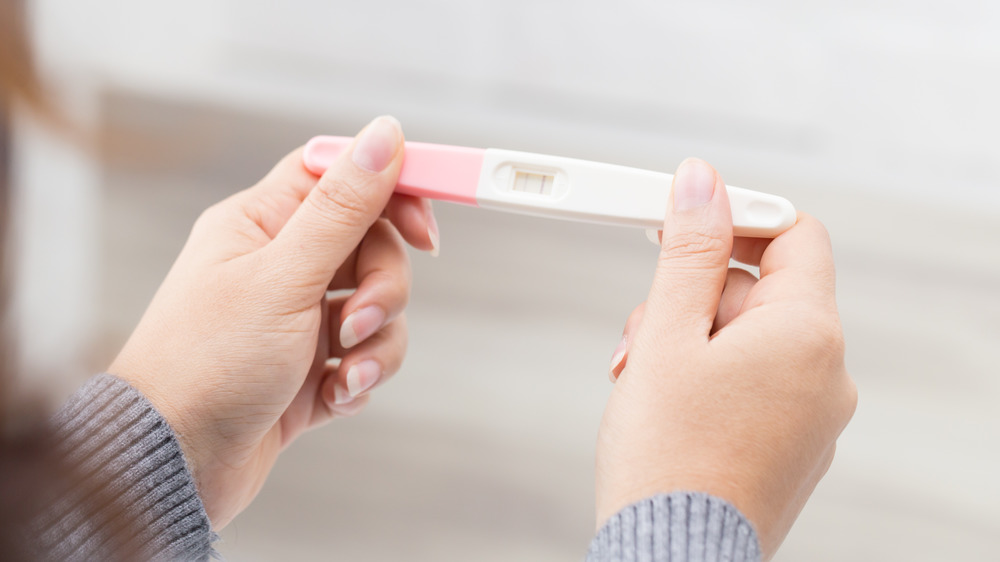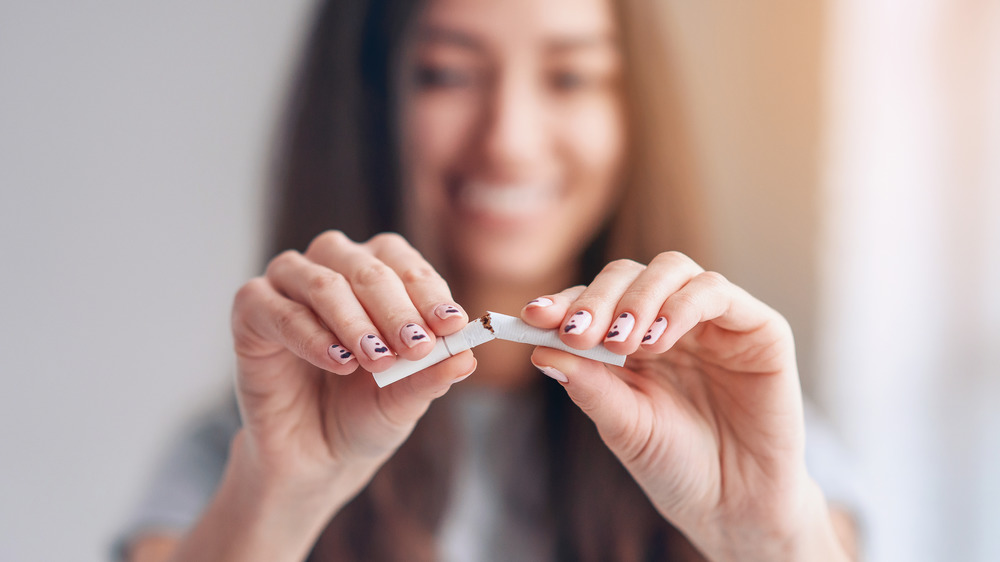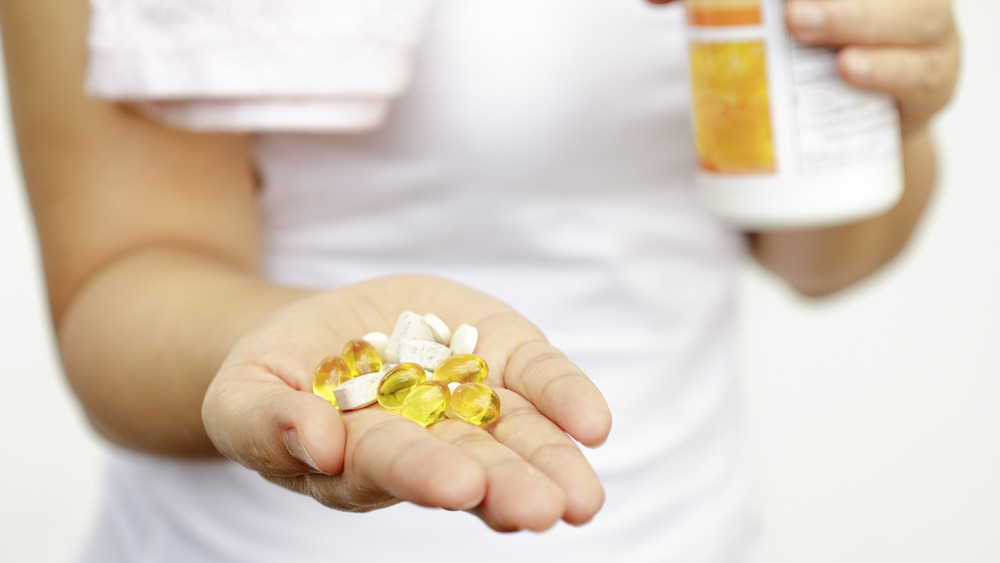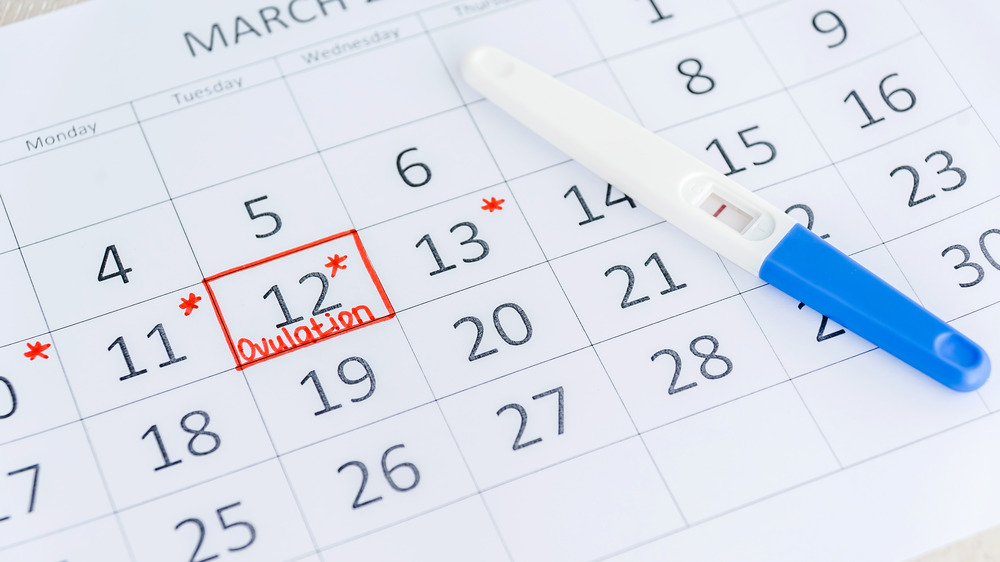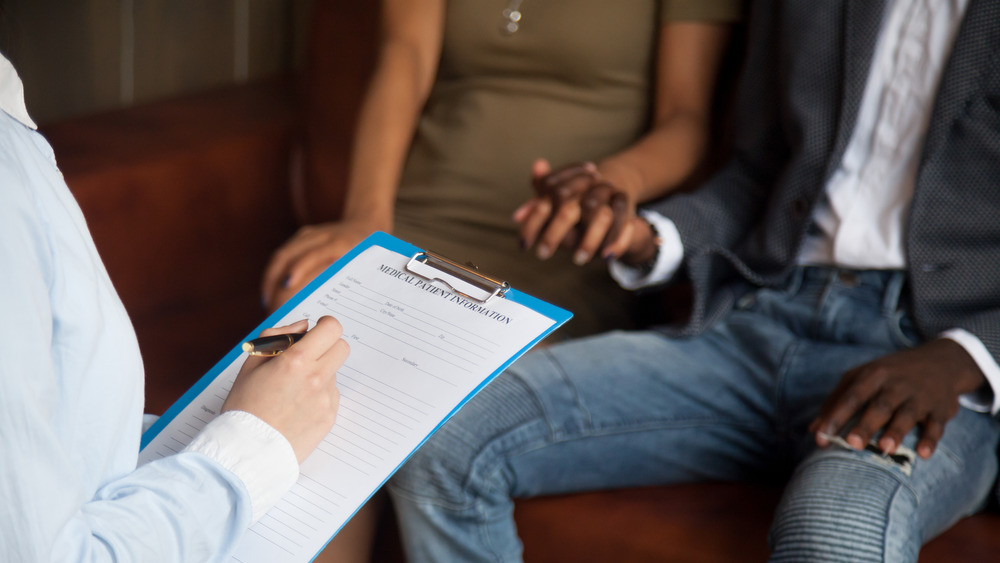Before Trying To Get Pregnant, This Is Everything You Need To Know
Trying to get pregnant can be both an exciting and nerve-wracking time. If you and your partner are nearly ready to make this momentous decision, you will want to do your due diligence first. No, it is unfortunately not as simple as just getting it on and getting knocked up. There are a lot of factors to consider, many potential missteps to try to avoid, and a few fair warnings to heed. So before you start daydreaming about those ten little toes and adorably chubby thighs (squee!), you should evaluate your own health habits and do a quick lifestyle check.
What's more, there are some simple steps you and your partner can take to ensure you are both physically and mentally prepared for the journey ahead. There are even some proactive measures you can try to hopefully boost your natural fertility. Feeling ready to take the pregnancy plunge? Here is everything you need to know before you start trying for a baby.
Consider going to the doctor before trying to get pregnant
If you are thinking about having a baby, it is time to get all your ducks in a row. And that starts with a regular wellness visit with your primary care physician or OB-GYN. In an interview with Today's Parent, maternity care specialist Batya Grundland recommended visiting your doctor about three months before you start trying to get pregnant, just to make sure your health is on track.
Your doctor will likely check to make sure you are up to date on all your vaccinations, talk to you about healthy lifestyle choices, evaluate any need for early genetic testing, and review medications you are taking. As explained by family physician Dr. Deanna Telner in Today's Parent, "There are risks to taking some medications and over-the-counter herbal supplements during pregnancy, so you'll want to switch off some and have a conversation about the benefits and risks of others." Certain treatments for type 2 diabetes or high blood pressure may need to be swapped out, and a few antidepressants could carry more risk than others. Finally, your physician might give you some (medical) words of wisdom to help you time your attempts for optimal results.
You should visit your dentist before getting pregnant
While you are making that all-important preconception doctor's appointment, scroll through your phone and dial up your dentist, too. After all, you will want to make sure you have a clean, radiant smile for all those monthly pregnancy photos. And, more importantly, you will need to take care of any serious oral health issues before you are expecting.
As explained by Everyday Health, those pesky pregnancy hormones can make you more vulnerable to dental issues, including tooth decay. Additionally, your gums will be more sensitive and swollen in pregnancy, making plaque buildup likely. Both of these issues can cause gum disease, which can cause all sorts of complications. In serious instances, periodontitis can cause preeclampsia, gestational diabetes, and even premature labor.
What's more, even if you see the dentist every six months on the dot, going for an appointment before you try to get pregnant will ensure that you won't risk exposing your baby to any level of radiation during those routine mouth X-rays (via Everyday Health).
Establishing an exercise routine before pregnancy will help set you up for success
Establishing a low-impact fitness routine before you are pregnant will help you in the near future. As noted by Motherly, being fit and engaging in exercise can boost a woman's fertility and decrease her discomfort level during those arduous — and often ache-filled — nine months. Plus, it helps ensure that her pregnancy weight remains within a healthy range. OB-GYN Shannon M. Clark explained to the site that embracing physical fitness and activity before getting pregnant can "decrease the risk of developing gestational diabetes and high blood pressure during pregnancy, and all the potential complications associated with these diseases."
When you are pregnant, you can even utilize certain exercises to help prepare your body for the physical challenges of labor, expedite a vaginal delivery, and possibly even prevent the need for a C-section, according to the Mayo Clinic. Nevertheless, the medical center cautioned, "Before you begin an exercise program, make sure you have your health care provider's OK."
Eating a healthy, balanced, fertility-friendly diet is important before trying to get pregnant
As noted by Harvard Health Blog, getting to a healthy weight before becoming pregnant is ideal for you and your baby, as excess weight tends to lead to pregnancy complications or trouble conceiving. Getting to an ideal weight, of course, starts with a healthy, balanced diet.
There are also several foods to consider adding to your diet to potentially help boost fertility. As recommended by Healthline, women who are hoping to get pregnant may want to think about upping their intake of fibrous foods like avocados and oats as well as antioxidant-rich fruits and vegetables. They may also try swapping out some animal proteins for more vegetable proteins, opting for high-fat dairy products, and cutting down on trans fats and refined carbs.
While you are monitoring your nutrient consumption, try to avoid excessive intake of Vitamin A; Harvard Health Blog noted that too much of this vitamin can be a bad thing, with negative consequences for a growing fetus.
Quit smoking before trying for a baby
You know that smoking is hazardous to your own health, but smoking while expecting is also dangerous for your developing little love. Yes, smoking increases the risk of birth defects, premature labor, and other serious consequences, as explained by the Centers for Disease Control and Prevention.
Smoking can even age your eggs and make getting pregnant more challenging. As noted by What to Expect, "Heavy smoking further damages your ovaries (along with your uterus) and affects hormone production." It can also increase the risk of ectopic pregnancy and miscarrying. However, your fertility will improve after you've ditched the cigarettes. Your partner should also quit smoking, too. Not only is secondhand smoke dangerous for you and a developing fetus, smoking can actually damage the DNA in sperm. "Quitting at least three months before trying for a baby is important to make sure the sperm is healthy when the baby is conceived," Your Fertility advised.
You and/or your partner should talk to a doctor to determine the best quitting method for your lifestyles. You may want to get patches or prescriptions, try hypnosis and acupuncture, wean yourself gradually, or go cold turkey (via What to Expect). Whatever method you try, feel good knowing you're doing what's best for you body and your growing family.
Cut back on the booze prior to trying to get pregnant
In preparation for pregnancy, you will definitely want to curb your alcohol consumption. This is especially true if you are a frequent or heavy drinker. First, you do not want to wait for a positive pregnancy test to stop imbibing. Drinking during pregnancy can have serious consequences and, as noted by the Centers for Disease Control and Prevention, "there is no known safe amount of alcohol use during pregnancy or while trying to get pregnant" and "no safe time during pregnancy to drink." Further, if you find it difficult to stop, you might consider seeking support before you add a baby to the picture.
As indicated by a study published in The Journal of Human Reproductive Sciences, alcohol intake can present an increased risk of infertility in women. Even two alcoholic beverages each day resulted in an elevated rate of infertility compared to just one beverage. While you're giving up booze, you might consider persuading your significant other to join you in this temporary sober journey. Moderate to heavy drinking can affect the quality of a man's sperm too, the study found.
Before trying to get pregnant, it's a good idea to research your family history and consider genetic screening
As explained by Parents, having genetic testing done before you get pregnant can give you and your partner peace of mind and help you plan ahead. These blood tests look for certain genetic diseases. If both parents carry a recessive gene for a certain disorder or illness, there is a 25 percent risk a baby will develop this genetic disease. The mom-to-be is usually tested first and if she does not carry a recessive disorder gene, then there is no risk to Baby even if the father does carry the recessive gene.
Talk to your doctor if you want to explore the options for genetic testing before trying to get pregnant. As noted by certified genetics counselor Angela Trepanier, "The diseases for which genetic testing is currently offered tend to be more common among certain ethnic groups." Your doctor will be able to go through your risk factors, according to Parents. Genetic testing will generally look for genes that could cause cystic fibrosis, sickle cell disease, Tay-Sachs disease, Fragile X syndrome, and thalassemia.
If you want to get pregnant, this is when you should go off birth control
If you are thinking about maybe, possibly, potentially, almost being ready to try, it is not quite time to get off your birth control pills. Dr. Alexadra Sowa, an internist, told Parents that "The most important thing to know about stopping oral contraceptives is that ovulation can return immediately. The synthetic hormones leave your system in a few days, so you can get pregnant the first month off the pill."
Likewise, when your IUD is removed, you can get pregnant that same month. That doesn't mean it's always instantaneous, though. Sowa elaborated, saying, "On the flip side, your period may not return immediately. It can take a few months for your period to return."
With this in mind, you shouldn't go off birth control until you're really ready. And if you're on the pill, you should finish out the full month before stopping. Dr. Sowa explained that going off the pill mid-cycle can lead to bleeding, plus "it can be hard to judge when you're ovulating." Furthermore, getting your period at least once after stopping the pill will help you more accurately determine your due date once you do get pregnant (via Parents).
It's never too early to start a prenatal vitamin
Ideally, you do not want to wait until you get a positive pregnancy test to start taking a prenatal vitamin. At that point, you would already be a few weeks into your first trimester. As such, you should talk to your doctor about adding a prenatal vitamin to your daily regimen once you are ready to start trying. You share your vitamin and nutrient supply with Baby for those nine long months, so it is important to make sure you have everything you need to feel your best and help that little one thrive. Folic acid, iron, and calcium are among the most important additions.
You can get a prescription from your doctor or choose an over-the-counter option. Prenatal vitamins also come with a pretty sweet bonus: Many women find that their hair, nails, and skin benefit from the extra nutrients in this type of vitamin. However, scientific data has yet to back up these anecdotal claims. Either way, there is no real downside to starting prenatal vitamins early. However, on a long-term basis, you don't really need the excess nutrients they offer (via Healthline).
Reducing stress before you become pregnant is advised
Stress comes with adulting. But excessive anxiety, worry, and woe can impede your mental health and have physical consequences. And believe it or not, it can even hinder your ability to get pregnant. Dr. Sarah Berga, physician and infertility specialist, broke down part of the science behind this phenomenon to WebMD, saying, "Stress hormones such as cortisol disrupt signaling between the brain and the ovaries, which can trip up ovulation."
Alice Domara, an infertility researcher and mind-body health specialist, provided further explanation to the site: "Your body is smart, it knows that (periods of stress) aren't good times to have a baby." What's more, Domar pointed out that women who are highly stressed tend to have less sex with their partners and may even smoke cigarettes or drink excessive caffeinated or alcoholic drinks to help cope. These factors, however, can have a further negative impact on fertility. Of course, getting a negative pregnancy test result month after month can also fuel stress and frustration, resulting in a "vicious cycle." Domar recommends nurturing yourself, especially through hatha yoga.
Here's how to plan the timing of trying for a baby
If you have not been on top of tracking your cycle, there is no time like the present to get out the calendar and start plotting your future pregnancy. Familiarizing yourself with your monthly pattern may help you identify your most fertile days.
Need a little refresher on how it all works? Ovulation generally occurs about 14 days before your next menstruation. As explained by Verywell Family, your most fertile time of the month is two to three days leading up to ovulation and during ovulation. Of course, every woman is slightly different. This is why tracking your period for a few months leading up to trying can help you with planning.
If you notice the secretion of more cervical mucus — a thick elastic-like discharge — you should probably give it a go and get busy with your partner. It also doesn't hurt to track the presence of cervical mucus on your calendar. Again, this just further helps establish a pattern. Additionally, you can use fertility apps and at-home ovulation tests to help guide the baby-making process.
Lay off the lube when trying to get pregnant
Getting down to baby-making business shouldn't have to be all calendars and basal temperatures. Nevertheless, if you desperately want to get pregnant, it can start to feel very technical. The truth is, though: When you get too caught up in the outcome, it takes the pleasure out of the process. Sex should be fun and mutually enjoyable, right?
Be that as it may, you should still consider removing your go-to lube from the otherwise sexy equation. A study published in Obstetrics & Gynecology noted that many lubricants impede sperm's ability to fertilize a woman's egg. Even if you're not a regular lube user, you may find yourself tempted to reach for a bottle to speed up the process. Those who are actively trying to get pregnant are often squeezing in quickies, after all. Nevertheless, OB-GYN Lakeisha Richardson advises patients to allow foreplay to enhance "female arousal" and increase "a woman's own natural lubricants" (via Healthline).
Furthermore, while you're clearing your nightstand of some not-so-fertility-friendly products, go through your medicine cabinet and chuck those vaginal washes. "Sometimes women don't think about the other things that they're doing ... that can create a hostile environment for pregnancy." Dr. Richardson told Healthline.
When should you consider seeing a specialist?
Getting that positive pregnancy test can be like hitting the lottery and although, we know there is way more to it, it can honestly sometimes feel as if it is a total game of chance. If you experience a few consecutive months of negative pregnancy test results, you may start feeling frustrated and dismayed. But there is hope for you yet.
As recommended by the American Pregnancy Association, a couple should seek out medical help if they have been unsuccessfully trying to get pregnant for a year. That may sound like a long time, but the confounding truth is that it can take a while. On the other hand, if you are 35 years of age or older, you should visit a specialist after six months of actively trying. Similarly, you should be more proactive if early menopause is common in your family, if reproductive cancers are part of your family history, or if you have an irregular cycle (via Verywell Family).

